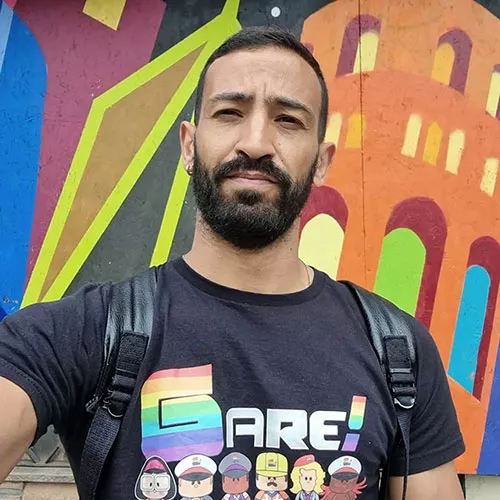How Gare! stands up for LGBT+ rights
Gare!, an association for LGBT+ employees at SNCF, was founded in 2000, shortly after France adopted legislation creating civil unions (Pacs). It has been working in close partnership with SNCF Group on equal rights issues ever since. Interview with Gare! president Ali Louni.

SNCF supports equal rights for same-sex couples and their families, assists those undergoing gender transition, and is steadfastly opposed to any form of exclusion or discrimination against LGBT+ individuals. In addition to our actions and the various materials we have created, we work closely with Gare! as part of a partnership agreement signed in 2013. In this interview, Gare! president Ali Louni reflects on the organization’s history, its mission on behalf of employees, and its accomplishments in towns, cities and communities across France.
When was Gare! created?
When France adopted civil unions in 2000, it became clear that we needed a voice representing these couples, gay or straight, to HR. That was especially true for international family travel vouchers. Married couples had certain rights that were being denied to those in civil unions, both same-sex and heterosexual couples. So we banded together to fight for our rights, and that effort led to the association.
What are some of the highlights of your history?
When “Marriage for all” legislation was passed in France in 2013, Gare! ramped up its efforts to secure certain internal HR rights for same-sex married couples. We worked closely with SNCF, which appreciated our expertise on the topic. That same year we signed our first partnership agreement with SNCF. Before, we’d been an independent association. But since 2013 we’ve had official ties to SNCF Group and receive a donation to help cover our expenses. Each agreement covers a 3-year period, and the most recent was signed in April 2025.

Gare! has over
400
members

18
employee volunteers serve on Gare!’s board of directors

All SNCF Group
companies
are represented, and Gare! works with the Group HR department
Does Gare! have members from outside SNCF?
Yes, because in addition to internal matters, we also deal with customer relations issues: passengers’ travel and railway station experience, during ticket and luggage checks, and so on. For that, we need outside perspectives. And our membership also includes employees of SNCF Group subsidiary Keolis France, with whom we collaborate on projects. The fact that Keolis operates in rural areas in France gives us a chance to consider the discrimination local LGBT+ people face there, not just when they are traveling.
How is Gare! different from an in-house employee network?
An internal organization would have less leeway to call out shortcomings. As an independent association, we can take our own positions, particularly when we think SNCF needs to do more to fight discrimination or respect members’ rights within the Group. To some extent, in-house organizations can’t overstep the line; they’re bound by a certain reserve. Whereas we can advocate for an employee in a difficult situation, even providing legal assistance.
What do you hope to accomplish for employees?
We work with HR to make sure everyone has equal rights, regardless of their sexual orientation or gender identity. We are, for instance, taking the initiative on the extension of child custody rights and have launched a major project with SNCF Group HR on child custody rights within same-sex families, which has been implemented in October 2024.
Do you assist individuals?
We help employees who are being discriminated against, insulted, or attacked. Here’s an example: say someone is being discriminated against and tells their higher ups, but the problem isn’t dealt with in a reasonable amount of time. In that case, we would contact the person’s manager directly and put the employee in touch with the Group HR department, with whom we work closely.
Is it easy to come out at SNCF?
People do still self-censor. Not everyone feels comfortable contacting us or the Ethics department. That’s another reason we make a point of raising awareness throughout the Group: speaking up is how you end discrimination. Our role is to be there for employees who are too scared or uncomfortable to reach out to their HR contact. They can remain anonymous. No one should ever be forced to come out at work, but it’s true that too many employees still censor themselves.
And lose out on certain benefits, perhaps.
Exactly, like parental leave for a new child, travel vouchers for their partners, health insurance, works council offers, things like that. That’s why it is so important to raise awareness among SNCF employees, so people feel welcome and understand that SNCF supports diversity in the broadest possible sense.
How?
We work with SNCF Mixité, of course, but also Action Sociale SNCF and SNCF diversity units to plan Group-wide seminars—to introduce Gare!, for starters. These seminars always have a number of booths, not just our own, which makes it less intimidating for folks to come up and chat. It’s easier to make connections.
What are the issues surrounding gender transition?
We provide individual assistance to anyone transitioning, and also work with their colleagues. First, we talk to the person’s manager about what a gender transition entails, what it will mean more generally, the kinds of questions teammates might have, and so on. We take a holistic approach. Naturally, we assist the individual any way we can—answering questions, particularly administrative ones, and facilitating exchanges with HR. Our work has led to the introduction of a process enabling people in transition to change their customary first name internally, before the change is made official at the Registrar's Office.
What about passengers?
From our perspective, conductors need to be better informed. Here’s an issue that might arise: a conductor asks a passenger for their ID and the photo doesn’t match the passenger’s appearance. The conductor might suspect identity theft. It’s a tough situation because of legitimate security concerns; conductors have to adhere to protocols while remaining courteous and empathetic.
Are any subjects still taboo?
No. We welcome all questions. For example, we’re working with SNCF Voyageurs to improve the way they handle gendered titles, either by eliminating them altogether or letting users opt out. For passengers, it’s an issue that arises when they buy tickets. Internally, for employees, it comes up when they fill out forms on the computer, and SNCF has a multitude of IT tools.
What about dress?
Uniforms and work clothes include a range of issues: access to changing rooms once an individual begins transitioning, non-binary persons’ access to rooms for staff other than the gender they were assigned at birth, or individuals who don’t feel comfortable with garments issued to them and prefer to wear the uniform traditionally designed for a different gender. Thanks to Gare! action, SNCF Voyageurs staff can now access all cloakroom rooms regardless of gender.
What is Gare!’s stance?
We would like SNCF to provide unisex garments. This issue came up when Germany’s Deutsche Bahn gave their employees their choice of which uniform to wear. We want SNCF to make uniforms more gender-neutral so employees feel comfortable.
Do you organize any events?
In 2019 we wrapped a TGV in rainbow colours to commemorate the 50th anniversary of the Stonewall Riots, and 50 stations were decked out in the colours of the LGBT+ flag.
What are some key dates during the year?
Every year we work with SNCF Group’s HR department to plan events for 17 May, the International Day Against Homophobia, Biphobia and Transphobia. We hold seminars and sometimes put on a theatre show in addition to sharing educational messages with employees. In 2023, we made headlines by signing an agreement with L'Autre Cercle1. The event was attended by France’s Minister of Transport and Deputy Minister for Gender Equality, Diversity and Equal Opportunities. And we take part in Pride events in all the big towns and cities.
What about in rural areas?
We march in the Rural Pride parade in the town of Chenevelles, Vienne in eastern France. We’ve worked with Keolis to organize a free shuttle running from the Châtellerault train station to the event’s staging area. It’s a chance to promote not just the Rural Pride event itself, but also public transportation.
Do you have ties to other non-profits?
We do a lot of work with Flag!, our sister organization at the French Interior Ministry; with Mobilisnoo at telecoms operator Orange; and with Rainbhopital on topics related to HIV, STIs and prevention. We also have an in-house agreement with Mutuelle Entrain, SNCF’s health insurance cooperative, to discuss health-related issues.
Any international contacts?
We regularly talk to rail industry associations and non-profits in other countries—Germany, the Netherlands, Austria, Belgium, the UK and Switzerland—as part of the Trainbow Europe network. We hold meetings and conferences on various topics to share our experiences and methods. Our goal is to help people in other countries create associations that will help us all advance LGBT+ causes together, both in the rail sector and in society generally. The next meeting in France is scheduled for October 2025.